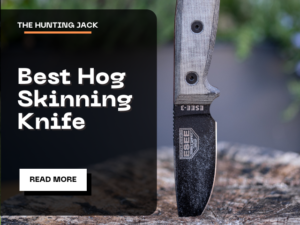So, you think you’ve got everything you need for a successful hunt, but do you really know what you need to put in that shiny new day pack?
With so much hunting gear on the market, deciding what’s actually needed for a deer hunting trip can be laborious. You just want to get out there and start taking some shots, right?
I’m here to help you through this mission with my guide to the 25 best bits of gear for hunting that shouldn’t be without a spot in your hunting pack. I’ll take you through the things I can’t live without so you, too, can avoid extra weight on your next trip and focus only on the essentials.
Let’s get stuck straight in.
Table of Contents
Toggle25 Essentials for Your Hunting Pack
1. Knife
A knife is perhaps one of the most vital pieces of kit for your pack, hence why I’ve put it at the top of my list. Your blade needs to be strong and sharp enough to handle field dressing your kill. If not, you’re going to have a much harder job and could injure yourself more easily.
2. Sleeping bag or survival blanket
Even if you’re only planning on staying out for a few hours, you never know when a trip might be extended. If you end up spending the night tracking down an animal, you’ll be thankful that you brought a lightweight sleeping bag or a survival blanket!
3. Binoculars
A solid pair of binoculars is key to finding that prize stag you’ve been waiting patiently for. Surveying your animal through your binoculars will also help you determine whether it meets the requirements for hunting. In other words, you’ll know at a glance if it’s undersized or not.
I also like to take a bino harness to keep my binoculars safely within easy reach. This will stop them from swinging around and getting damaged, too.
4. Rangefinder
Most hunters, myself included, agree that a rangefinder is crucial in planning out a successful and ethical shot. If you know how far away your target is, thanks to your rangefinder, you’ll know straight away whether you can confidently make the shot or if you’re more likely to miss and injure the animal.
5. Webbing
I love multi-functional equipment when I’m out in the field, webbing being the perfect example.
You can use it to strap gear to your pack, lift gear up to your tree stand, or loop it over a branch to pull your catch up, ready for skinning.
6. Pruning shears
But I’m going hunting, not gardening!
I hear you, but listen up. Imagine this: you’re perched up on your tree stand, where you’ve been waiting patiently for hours for that prize buck to come into range. He’s right in your line of sight, but wait! There’s a darn branch in the way!
Enter pruning shears.
With this nifty little gadget, you can cut that pesky twig out of the way so you can make the shot you’ve been waiting for. Thank me later!
7. Ear plugs
If you’re a shotgun hunter, don’t head out without earplugs – I’m sure you don’t need me to tell you why. It’s not the end of the world if you don’t use them once or twice, but if you’re a regular hunter like me, you’ll want to do all you can to look after your hearing!
8. Map and notebook
You might feel like you’re going back to school, but trust me, you won’t regret taking a notebook and a pencil. Perhaps you want to record what wind speed and direction work at a particular site, or even how to get to your site again next time.
That leads to my next point – a map. We’ll get into GPS later, but you shouldn’t forget a paper map, either. A map will help you locate access points and make sure you stick to the boundaries of where you’re allowed to hunt. It’s always worth having a backup in case your GPS fails.
9. Snacks
Really, no day packs should be without snacks, let alone those taken hunting. Hiking and hunting all day is hungry work, so make sure you have a plentiful supply of energy-boosting snacks like nuts, jerky, and protein bars.
If you have a little more room in your pack and you have a long day planned, a freeze-fried meal is another option.
Always try to keep spare rations in case of emergencies. You might even want to pack a few snacks that you’re not too keen on, so you’re less likely to eat them within the first hour of your trip!
10. Fire starter or lighter
As I said above, you never know when a trip might extend into the small hours of the night. So, a lighter or fire starter (or both) is worth carrying in case you need to set up an impromptu camp.
Worst-case scenario, a fire starter could get a flame going to help attract attention if you’re hurt. It’s a tiny addition to your pack that could save your life, so don’t forget it!
11. Game call
You might want to keep your call in your pocket rather than your pack, or at the very least, keep it in an easy-to-reach part of your bag. There’s nothing worse than spotting a buck and then scaring him off when you’re rummaging through your pack – trust me, I’ve been there.
12. Extra orange vest
An extra orange vest? Why? You might think just one is enough, but that’s where you’d be wrong. If it suddenly starts pouring down, you won’t need to battle to remove your vest. Just throw on your waterproofs, then your extra orange vest on top, and you’re winning.
13. Baby wipes
Many hunters, including myself, swear by the versatility of baby wipes. Yes, really. They can be used for anything from cleaning up after a bathroom break to wiping blood and muck off your hands before a snack.
A quick wipe down with a baby wipe also means you don’t have to put a bloody knife in with your clean gear.
14. GPS
Maybe you like to do it old-school and use a paper map. If you’re like me, you’ve joined the 21st century and prefer a GPS receiver. Don’t forget extra batteries, just in case!
15. Hunting license
The last thing you want is to get into any trouble with landowners before the hunt begins. I’d also recommend you keep your hunting license in a waterproof container or bag – if it gets damaged, you’ll be stuck!
16. Sleeping pad
If you’re going out for more than one day, you won’t want to go without one of these. A sleeping pad will make your night much more comfortable, so you’re refreshed and ready to get out there again the next day.
17. Trekking poles
These are essential if you’re going to be navigating some tricky terrain, which is pretty common for us backcountry hunters. Trust me; you won’t regret having a quality pair of trekking poles by your side when you’re going down a steep hill with your kill strapped to your pack.
18. Extra ammo
There’s nothing worse than having your hunting trips cut short because you didn’t pack enough ammo, is there? Depending on how good a shot you are and how long you want to stay out for, the amount you need to take will vary. In any case, take more than you think you might need!
19. Rubber gloves
Even if you think you’re tough enough to get stuck in and start field-dressing your kill with your bare hands, you shouldn’t. Sure, you might not mind a little blood on your hands, but you never know what nasties might be lurking in that buck.
Better to be safe than sorry and keep a pair of rubber gloves (and a spare) in your pack. If you have a cut on your hand, bacteria and parasites could easily make their way in and make you pretty sick. Don’t say I didn’t warn you!
20. Game bags or trash bags
Bags are indispensable for packing up your meat to keep it away from the rest of your gear. Trash bags will do in a pinch, but game bags are much more durable and less likely to tear under the weight of a particularly large chunk of meat.
21. Small first aid kit
You never know when disaster might strike out in the field, but you don’t have to prepare for the end of the world.
A first aid kit should contain basics like Band-Aids, tourniquets (or paracord), antibacterial ointment, and hand sanitizer. These simple items will keep you comfortable should you meet an unfriendly cactus or nick your finger with your knife.
22. Water
You might want to save weight in your pack, but you should never head out without at least a small bottle of water. Water is the single most important thing for survival. Even if you know there’s a clean water source where you’ll be set up, hiking is thirsty work, so always keep some water with you in case you have to wander from the water source.
23. Headlamp or flashlight
I prefer a headlamp when out hunting since it keeps my hands free to carry other things or dress an animal. Look at the lumen rating to ensure it’s bright enough for the kind of landscape you might find yourself in. You’ll also want to go for something with a decent battery life just in case you do end up spending a few hours out after dark unexpectedly.
Whatever option you choose, make sure you have spare batteries, so you’re not left in the dark, literally.
24. Warm weather gear
If you’re heading out on a hot day, don’t forget basics like sunscreen, bug spray, and anything else that will keep you comfortable. These simple items will go a long way in making a difference between an enjoyable hunt and a miserable one!
25. Cold weather gear
At the opposite end of the scale, it’s equally important to prepare for when the weather might take a turn for the worse. Don’t forget your rain gear and extra clothing – if you get soaked to the bone within the first five minutes of your trip, you’ll be in for a miserable day.
Hand warmers are a nice extra for cold weather hunting that you’ll be glad you brought when your fingers start turning numb!
FAQs
How do I organize my hunting backpack?
If you’re a newbie hunter wondering how to pack your hunting backpack, keep your lightest and bulkiest items at the bottom of your pack. Make sure the things you’ll need the most are at the top or in pockets where they’re easy to access.
The heaviest items should be stashed close to the frame to make a larger bag more comfortable to carry.
What should you not forget when hunting?
Everything listed above is essential, but you really can’t forget water, a first aid kit, waterproofs, a knife, and a headlamp when hunting.
What should a beginner hunter need?
New hunters need to first make sure they’re dressed for the occasion with suitable clothing and boots, a sturdy backpack (if you’re looking for the best saddle hunting backpack, I’ve got you covered), binoculars, calls, and so much more.
Wrapping Up
So there you have it: my top 25 items that any hunter needs in their pack. While the exact gear you need varies depending on what you’re hunting and where you’re hunting it, the above are must-haves based on my own personal experience, so take note!



